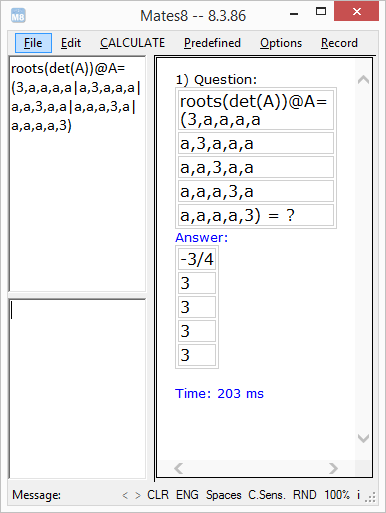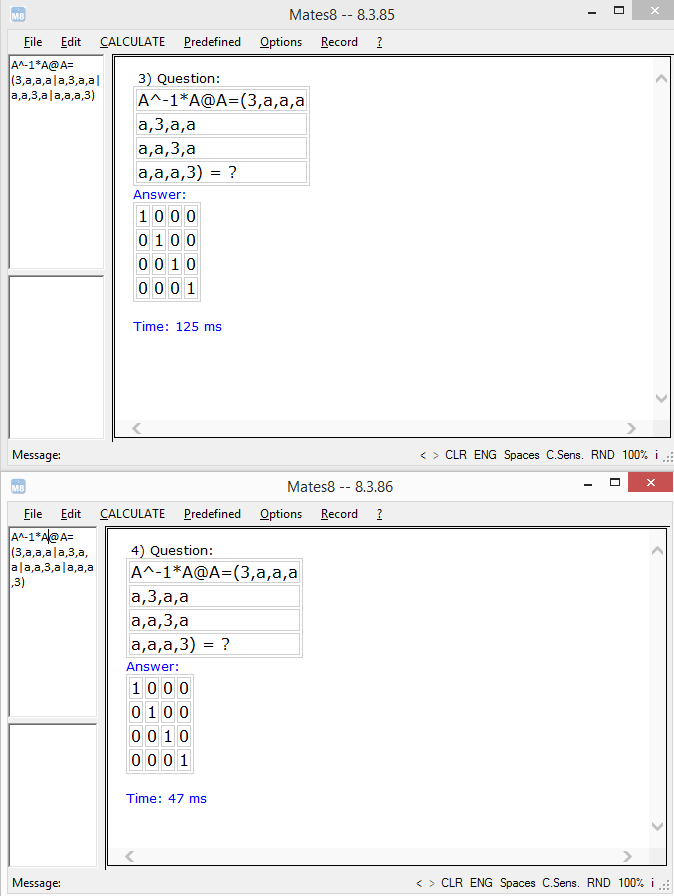The present code snippet just does an especific task. This is, given an ordered sequence of natural numbers, starting at zero, generate all the different permutations there can be. When we talk about permutations, the order of the sequence does matter. So, the sequence 0, 1, 2 differs from 2, 0, 1.
For example, think about a 4-7-2 lock combination sequence. Changing the sequence to 2-7-4 would not open the lock, of course. Properly speaking in mathematics, we are talking about permutations, because the order does matter. On the other hand, if the order did not matter, we would be talking about combinations.
So, what does present Console application do? First, asks for how large the sequence must be. Possible values of N must be greater or equal to 3 and less or equal to 10 (3<=N<=10). Then asks if the sequence generation must be saved into a text file and/or displayed. After the sequence is generated, requests if the generated N! permutations should be verified. All of them should be different, this is, there must be no 2 or more equal sequences. If you play around with the application, changing just one of the numbers of the variable vTable()(), for instance, changing New Int32() {1, 2, 3} into New Int32() {1, 1, 3} implies failing any generation N>=4. Any change to the next array New Int32() {3, 1, 3, 1} would imply failing for N>=5.
The table is taken from http://comjnl.oxfordjournals.org/content/6/3/293.full.pdf and it is linked at Wikipedia http://en.wikipedia.org/wiki/Heap's_algorithm
I have to be honest, because I did not follow too much the explanations and flow diagrams. So I had to think by myself for a way to make the algorithm happen and work. If you find any failure, please let me know.
As you may see, the algorithm is not recursive. There is an iteration process and exits when i>= N, i.e. when the right-most number is going to be interchanged for the N-th time. If you like to dig into the code, first take a look to the above links.
Just let me comment a bit the array vIndex(). When a new sequence is generated vIndex(1) is incremented from 0 to 1. The next time from 1 to 2 but because of the tailing ...mod (i+1), here mod(2), vIndex(1) will be 0. So i is incremented to 2 and so vIndex(2)=1. The process continues and when vIndex(2) equals 3, a zero is assigned to vIndex(2) and vIndex(3) is incremented by one (i=3). Then the "if i>2 then" instruction branches so that the positions interchanged follow the rules given by the table inside vTable()() (see Table 1 at Heap's .pdf document).
Permutations in Vb.net
Imports System.IO
Module Module1
Sub Main()
Try
Console.WriteLine("Numbers to permutate (3<= N <= 10), enter N= ? ")
Dim e1 As String = Console.ReadLine
Dim N As Int32
If Not Int32.TryParse(e1, N) Then
Console.WriteLine("Could not parse N.")
Exit Try
End If
If N < 3 OrElse N > 10 Then
Console.WriteLine("N is out of bounds.")
Exit Try
End If
Console.WriteLine("Save to file (Y/N)?: ")
e1 = Console.ReadLine
Dim bSave As Boolean = False
If Len(e1) AndAlso LCase(e1.Chars(0) = "y") Then
bSave = True
End If
Console.WriteLine("Should permutations be displayed (Y/N)?: ")
e1 = Console.ReadLine
Dim bDsp As Boolean = False
If Len(e1) AndAlso LCase(e1.Chars(0)) = "y" Then
bDsp = True
End If
Console.WriteLine("")
Dim sFile As String = String.Empty
Dim perm()() As Int32 = _
HeapsPermByInterchange(N, bDsp, bSave, sFile)
Console.WriteLine(vbCrLf + "Done!" + vbCrLf)
If bSave Then
Console.WriteLine("Saved to file: " + _
vbCrLf + sFile + vbCrLf)
End If
Console.WriteLine("Verify (Y/N)?: ")
e1 = Console.ReadLine
If Len(e1) AndAlso LCase(e1.Chars(0)) <> "y" Then
Exit Try ' no verification
End If
Dim msg As String = String.Empty
If Not verifyPermutations(perm, N, msg) Then
Console.WriteLine(msg)
Else
Console.WriteLine( _
vbCrLf + "Permutations have been successfully verified!" _
+ vbCrLf)
End If
Catch ex As Exception
Console.WriteLine(ex.ToString)
End Try
Console.WriteLine("Press Enter to exit.")
Console.ReadLine()
End Sub
Function HeapsPermByInterchange(n As Int32, _
Optional bDsp As Boolean = False, _
Optional bSave As Boolean = False, _
Optional ByRef filePath As String = "") As Int32()()
' See http://en.wikipedia.org/wiki/Heap's_algorithm
' and also http://comjnl.oxfordjournals.org/content/6/3/293.full.pdf
Static vTable()() As Int32 = { _
New Int32() {1, 2, 3}, _
New Int32() {3, 1, 3, 1}, _
New Int32() {3, 4, 3, 2, 3}, _
New Int32() {5, 3, 1, 5, 3, 1}, _
New Int32() {5, 2, 7, 2, 1, 2, 3}, _
New Int32() {7, 1, 5, 5, 3, 3, 7, 1}, _
New Int32() {7, 8, 1, 6, 5, 4, 9, 2, 3}, _
New Int32() {9, 7, 5, 3, 1, 9, 7, 5, 3, 1}, _
New Int32() {9, 6, 3, 10, 9, 4, 3, 8, 9, 2, 3}}
Dim ret()() As Int32 = Nothing
Dim fs As FileStream = Nothing
Dim sw As StreamWriter = Nothing
Try
Dim vIndex(n) As Int32
Dim c As Int32 = 0
Dim aux, iAux, viAux(n) As Int32
Dim i As Int32
Dim fact As Int32 = n
For i = n - 1 To 2 Step -1
fact *= i
Next
Dim nDigits As Int32 = Math.Floor(Math.Log10(fact)) + 1
Dim sFormat As String = "{0:" _
+ Microsoft.VisualBasic.StrDup(nDigits, "0") + "}: "
ReDim ret(fact - 1)
Dim cI(n - 1) As Int32
For i = 0 To fact - 1
If i < n Then cI(i) = i
ReDim ret(i)(n - 1)
Next
If bSave Then
filePath = Microsoft.VisualBasic.CurDir _
+ "\perm" + n.ToString + ".txt"
fs = New FileStream(filePath, FileMode.Create)
sw = New StreamWriter(fs)
End If
Dim iOld As Int32
Do
If bDsp Then
Console.Write(String.Format(sFormat, c + 1))
End If
For i = 0 To cI.Length - 1
If bDsp Then
Console.Write(cI(i).ToString + " ")
End If
If bSave Then
sw.Write(cI(i).ToString + " ")
End If
ret(c)(i) = cI(i)
Next
If bDsp Then
If c Then
Console.Write(" --- ")
If iOld > 2 Then
Console.WriteLine((iOld + 1).ToString + _
"," + (iAux + 1).ToString)
Else
Console.WriteLine("1," _
+ (iOld + 1).ToString)
End If
Else
Console.WriteLine("")
End If
End If
If bSave Then
sw.WriteLine("")
End If
c += 1
i = 1
Do
vIndex(i) = (vIndex(i) + 1) Mod (i + 1)
If vIndex(i) Then Exit Do
i += 1
If i >= n Then Exit Try
Loop
iOld = i
If i > 2 Then
iAux = viAux(i)
iAux = vTable(i - 3)(iAux) - 1
aux = cI(iAux)
cI(iAux) = cI(i) : cI(i) = aux
viAux(i) = (viAux(i) + 1) Mod i
Else
aux = cI(0)
cI(0) = cI(i) : cI(i) = aux
End If
Loop
Catch ex As Exception
Throw ex
Finally
If sw IsNot Nothing Then
sw.Close()
End If
If fs IsNot Nothing Then
fs.Close()
End If
End Try
Return ret
End Function
Public Function verifyPermutations( _
perm()() As Int32, N As Int32, _
Optional ByRef msg As String = "") As Boolean
Try
Dim i, j As Int32
Dim fact As Int32 = N
For i = N - 1 To 2 Step -1
fact *= i
Next
Dim vStr(fact - 1) As String
For i = 0 To fact - 1
For j = 0 To N - 1
vStr(i) += Chr(&H30 + perm(i)(j))
Next
Next
Array.Sort(vStr)
For i = fact - 1 To 2 Step -1
Dim pos As Int32 = Array.BinarySearch(vStr, vStr(i))
If pos >= 0 AndAlso pos < i Then
Exit For
End If
Next
If i > 1 Then
j = Array.IndexOf(vStr, vStr(i))
msg = String.Format( _
"rows {0} and {1} are repeated: ", _
i + 1, j + 1)
msg += " ("
For j = 0 To N - 1
msg += perm(i)(j).ToString
If j < N - 1 Then
msg += ", "
End If
Next
msg += ")"
Return False
End If
Catch ex As Exception
Throw ex
End Try
Return True
End Function
End Module
Reverend Jim
4,780
Hi, I'm Jim, one of DaniWeb's moderators.
Moderator
Featured Poster
xrjf
213
Posting Whiz
Premium Member
xrjf
213
Posting Whiz
Premium Member
Reverend Jim
4,780
Hi, I'm Jim, one of DaniWeb's moderators.
Moderator
Featured Poster
xrjf
213
Posting Whiz
Premium Member
xrjf
213
Posting Whiz
Premium Member
xrjf
213
Posting Whiz
Premium Member
web_5
0
Newbie Poster
xrjf
213
Posting Whiz
Premium Member
Be a part of the DaniWeb community
We're a friendly, industry-focused community of developers, IT pros, digital marketers, and technology enthusiasts meeting, networking, learning, and sharing knowledge.



